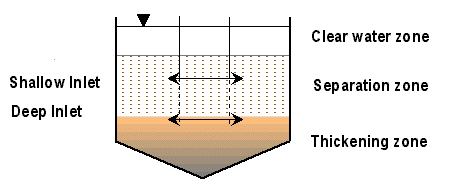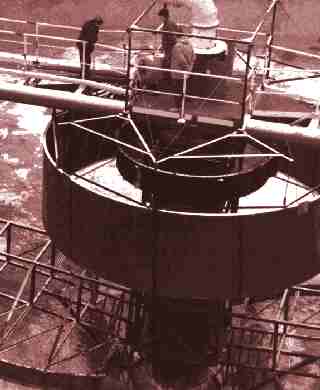INLET ARRANGEMENTS
Inlet arrangements are substantially different in conventional
and "enhanced flocculation" clarifiers.
Conventional clarifiers
Conventional clarifiers are typically center-fed, with
vertical inlet pipe discharging mixed liquor horizontally into a cylindrical
bottomless well from which is the outlet distributed by ports or other
structures into the clarifier. Though some arrangements are claimed to be
superior to others, in real life the difference in performance is not dramatic. Principle difference, however, is between shallow and deep
inlets.
| Shallow inlets
frequently cause currents and produce higher effluent TSS. On the
other hand, clarifiers with shallow inlets are rather resistant to short
peak flows. |

A
sketch of a clarifier with flocculation well During high SVI episodes, sludge blanket rises and the
height of the inlet zone (clearance) diminishes. The clarifiers behavior
is similar to the deep inlet conventional clarifiers with their positive
and negative features (see the right column). |
Deep inlets introduce
the mixed liquor into the sludge blanket which is in consequence
fluidized. Incoming suspended solids are "filtered" (floc-filter)
in the sludge blanket and effluent quality can be excellent. Resistance
to short term peak flows is poor and the upper layer of fluidized sludge
blanket can be lost from the clarifier and produce effluent TSS in the
order of hundreds mg/l. |
There are many old shallow final clarifiers in Europe and elsewhere. During
plant extensions they have been in many cases supplemented by new, deeper
clarifiers. A sensible use of the old ones is to load them moderately and by
approx. constant flow and convert them to deep inlet. It is completely wrong to
admit peak flows to shallow clarifiers with deep inlet. New deeper clarifier can
process the variable additional flow.
Enhanced flocculation clarifiers
|
Flocculation inlet into a large industrial clarifier (winter 1999)
The inlet well has typically a bottom and the influent is discharged
into a bottomless flocculation cylinder of a relatively large diameter, 20-30%
of the clarifier diameter. |

|
|
|
|

